Description
Peaberries are unique, they come on all coffee trees but are a bit of a rarity. Some offerings do not screen them out, others do. In a coffee cherry, usually there are two seeds, they grow against each other creating the “flat” side of the coffee. Occasionally there is only 1 seed, it will grow rounder and a bit denser, this is called a peaberry.
This bundle contains 1 pound each of:
Costa Rican Turrialba – Aquiares Estate – Grand Peaberry
The name Aquiares means “land between rivers” in the Huetar indigenous language, and Aquiares Estate is commonly referred to as “Aquiares Coffee and Community.” It is the largest farm in Costa Rica and home to 1,800 people. Although the farm was founded in 1890, Alfonso Robelo is the man responsible for its transformation a century later. Alfonso arrived in Costa Rica in the 1980’s seeking refuge from the civil war in Nicaragua, where he was politically active. When politics soured into violence, he fled the country to keep his family and himself safe after receiving several threats against his life. Once in Costa Rica, Alfonso began building the Aquiares community on the enchanting slopes of the Turrialba volcano, a lush area of forests, rivers, fauna, and bright flora.
Tasting Notes: Crisp, clean and complex. A wonderful coffee from light to dark but avoiding extremely light or dark roasts will provide the best cup. Roasts on the lighter side will be a bit sharper with some very nice green apple like acidity balanced with a bit of semi-sweet cocoa powder dark tone. The floral aromatic adds some nice depth. A bit sharp but very tasty. Medium to borderline-dark roasts accentuate the bakers chocolate tones and bring the acidity down to a hint; still reminiscent of green apple but far less punchy in the cup. A much smoother roast point. Darker roasts work nicely as well but are on the strong side, a big punch of bakers chocolate with floral aromatics and low acidity. Works great for espresso and/or those who corrupt the cup (kidding) with a little milk/cream at the just touching into 2nd crack roasts.
Roasting Notes: Pretty easy to roast for a nice dense peaberry, good bean size, even roasting with medium to low chaff. Don’t go too quick on the roast, good to drag it out a bit to make sure the beans develop nicely. With the more green apple like acidity, good to let it setup for a couple days to see it shine, pretty sharp within the first 24 hours but mellows within a couple days to exotic and identifiable tones.
Alfredo challenged the status quo, transforming the relationship between landowner and farm workers. He brought a visionary approach to Aquiares, a farm suffering from low prices and instability. Aquiares had more than 200 employee homes on the farm, but because none owned their home, there was great insecurity in the workforce. Alfonso saw this as an opportunity to strengthen the company by having people feel pride in the coffee they produce. He evolved the farm into a small town where workers purchased their own homes. Today, Aquiares remains a model of sustainable agriculture.
Nowadays Alfonso’s son, Diego, manages the farm. Under his lead, the farm has taken a fresh approach to specialty coffee and exploring the farm’s potential. Through excellent agricultural management, embracing new varieties, and experimenting with processing, Aquiares has become a trailblazer among specialty coffee producers in Costa Rica and all of Central America.
Aquiares focuses on carbon neutrality and measures its greenhouse gas emissions to calculate its carbon emissions against its offsets. An agent verified under the International Panel on Climate Change norms verifies these calculations and Aquiares’ carbon measurement and emissions reduction are part of Costa Rica’s Nationally Appropriate Mitigation Action. In addition to capturing carbon, the farm’s protected biological corridors have long ensured the wellbeing of local animals and plants. Aquiares also welcomes researchers from around the world to conduct agricultural and environmental studies on their land. Projects have included investigating the benefits of agroforestry on soil health and observing the diverse bird and wildlife species that thrive in an agroecological environment.
Aquiares is an example of innovation and perseverance whose benefits extend beyond the farm and workers and serve as a model for sustainable, equitable production for the broader coffee industry. The lots selected by Ally Coffee from Aquiares represent our shared commitment to sustainability, equity, and innovation.
Turrialba Region
The region of Turrialba is Costa Rica’s hidden coffee gem. The city of Turrialba is a modest agricultural town in the Province of Cartago, and the coffee farms spread throughout the Canton of Turrialba, from smallholder plots to the country’s largest estates, produce coffees with a range of cup profiles and the most interesting genetic legacies.
Turrialba is home to CATIE, the Center for Tropical Agricultural Research and Education, one of Central America’s permier crop research and development sites as well as one of Latin America’s largest living coffee tree variety collection. Along with other research institutions, CATIE helped produce many of they hybrid and selected coffee varieties now common in Costa Rica and neighboring countries.
The Turrialba Volcano is still active today—it began erupting more consistently starting in 2014—and the region’s volcanic soil is rich with nutrients. The area’s farmers grow vegetables and sugarcane as well as coffee and landowners in the lower area raise beef cattle. Turrialba’s productive land supplies much of Costa Rica’s domestic needs and coffee prepared for export passes through the area’s private mills, which are more common here than the cooperatives organized in other cantons.
Kenya Premium Muranga – New Kiriti – Gondo PB
First New Crop 2020/21 Kenya Coffee!
The Gondo mill has been one of our favorite Kenyan offerings for the last 3-4 seasons, great example of what Kenyan coffee should taste like. Crisp, clean floral, sweet, spicy and exotic! Located in the Muranga growing region along the Aberdare Mountain range on rich red volcanic soil, the areas surrounding the Gondo factory are ideal for producing some of the finest Kenyan coffee.
Individual farmers in these fertile foothills typically harvest from around 250 coffee trees on half-acre plots and deliver cherry to the Gondo factory, which is one of 3 factories managed by an umbrella farmers’ cooperative society (FCS) called the New Kiriti Farmers’ Cooperative Society. At the Gondo factory only the ripest cherries are delivered, and additional hand sorting and floating is done to remove less dense and damaged beans before the coffee is depulped, fermented and washed.
After the coffee is washed, it’s soaked in fresh water for long periods of time to solidify the hallmark Kenyan profiles. The coffee is dried over a period of two weeks on raised beds, which are carefully constructed to ensure proper air circulation and temperature control for optimal drying.
Tasting Notes: A great more sizzling (high acidity) Kenya coffee. Lighter roasts will show strong lemony floral acidity, sweet edged but almost enough to pucker up if super light, balanced with some hints of the classic spicy (slight tea like herbal) chocolate notes. If super light roasted, very cool acidity but a little underdeveloped in the aftertaste, city roast is perfect for the lighter roast fans. Pushing to a medium roast will greatly reduce the acidity in the cup but still give a very buzzy mouthfeel. Medium bodied and smooth with lots of exotic hints popping out in the cup to let you know its a Kenyan coffee. Darker roasts get much stronger, considered a delicate cup until you hit 2nd crack which will add a full body and more bittersweet dark tones with some excellent depth of flavor. Holds the darker roasts very nicely but almost a shame to roast out the wonderful acidity of the cup.
Roasting Notes: Easy to roast, medium chaff level and pretty even roasting. One can notice a bean or two a bit lighter but nothing like a natural or honey processed. Lighter roasts would be considered high acidity, darker roasts medium to low acidity.
Papua New Guinea – Carpenter Estates – Bunum Wo Kula Peaberry
Read More:
Papua New Guinea “The Wild West Of Coffee Production”
Papua New Guinea Carpenter Estates Coffee
This season we went with what they call Kula processing. Kula processing means only washed processed beans; dried on raised drying beds and double screened via color sorter and double hand picked. We team up with our buddy Vikram to insure the best beans. Basically, it means the best of the best from Carpenter Estates.
These Carpenter Estate coffees are gems – nothing like your traditional PNG coffees. Almost a 0 defect screen with immaculate processing. You can just look at the beans and see the care and time that went into them.
All coffee bearing the Carpenter Estate name is grown at over 5000 feet elevation. All of their Estates considers soil and water conservation as a priority, and, the plantation is bird and eco-friendly. The plantation employs a medium density shade strategy, using two types of shade trees. This promotes even ripening of coffee cherries and provides habitat for at least 90 species of birds.
These are washed processed Arabica coffee. Quality Control begins in the field; Cherry coffee is hand-picked and carefully checked for uniformity; it must be red and fully ripe which allows for the correct balance of sugar and acid within the cherry. This selected cherry is then pulped on the day of picking.
A fermentation process follows, for a period of three days broken every 24 hours by washing – but unlike most other brands, the Carpenter process follows this by total immersion in water for a further day, which creates a superior coffee. Careful conditioning of 21 days is followed by hulling, grading, color sorting and finally hand sorting. This combined with rigorous quality control before packing produces the finest green bean for which Carpenter is renowned.
All grades are then continuously sample-roasted and liquored by experts. This provides a final check on the quality of the green bean product, and is a practice unique in Papua New Guinea.
Tasting Notes:
Silky smooth and clean. Medium acidity with good sweetness and balance. Chocolaty type cup of coffee with some very cool nutty and spicy herbal accents. If you roast before 2nd crack, which is preferred, one can balance in some melon and fruit acidity into the mix which is a big plus to the depth of flavor.
Roasting Notes:
Good almost anywhere – I would still avoid real light roasts for you will find a bit of raw acidity and underdeveloped darker tones. City plus to as dark as you want to go. To see it shine, keep it before 2nd crack. Dark roasts will impress dark roast fans but will burn out many tones that make this cup pretty stellar.

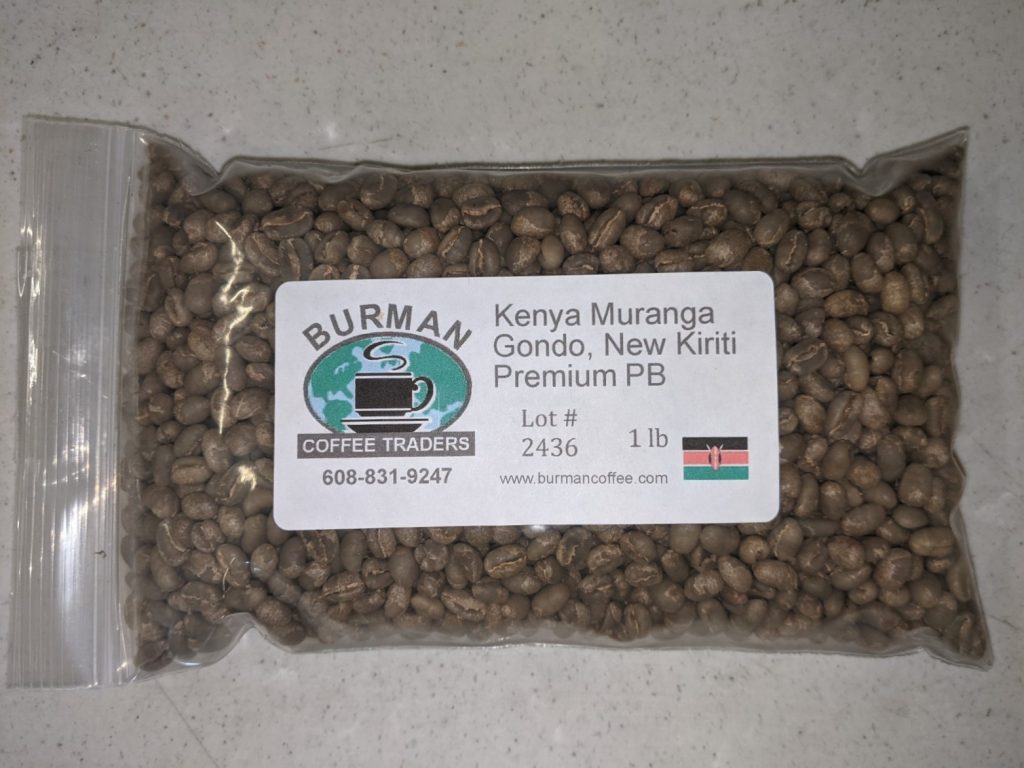
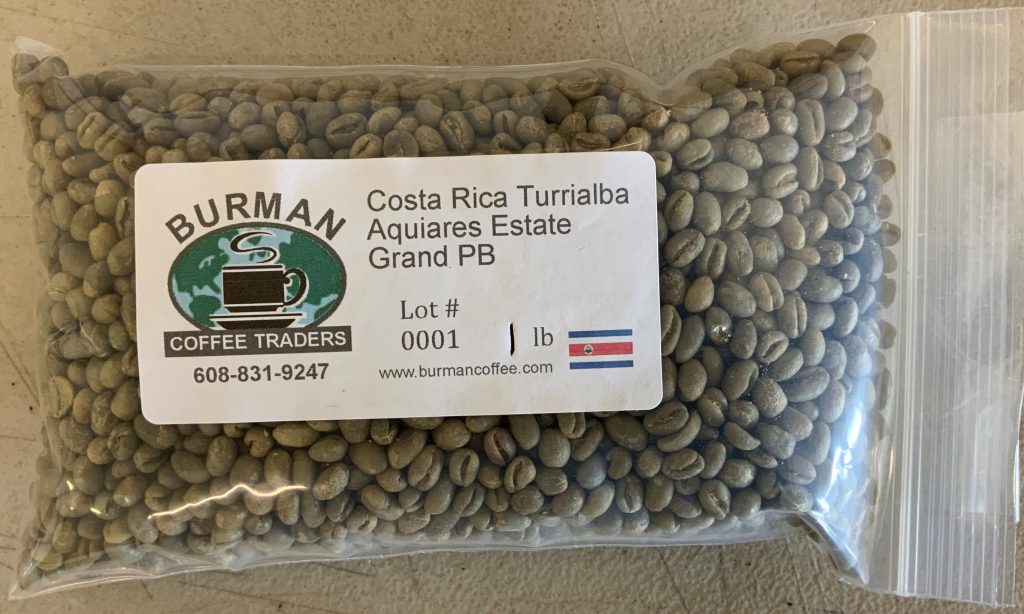
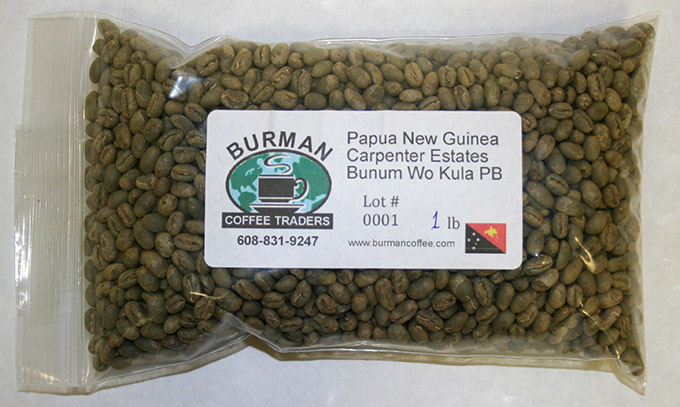

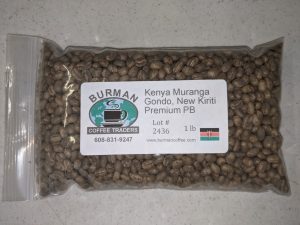
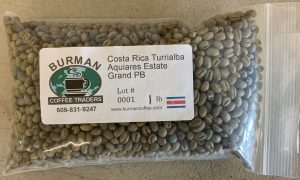
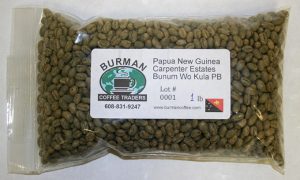
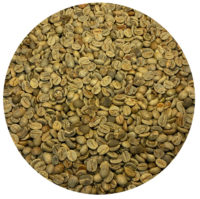
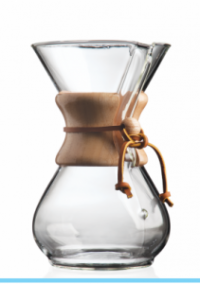

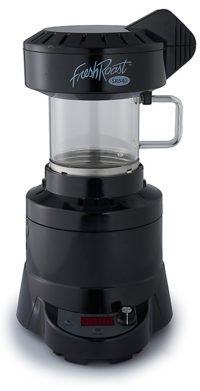



Reviews
There are no reviews yet.